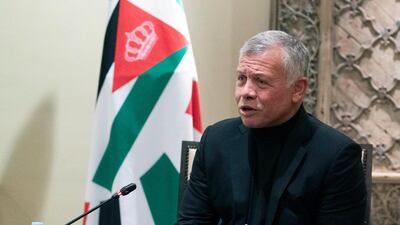Jordan's King Abdullah ordered an end to the current parliamentary session on Monday, a day after the legislature removed a tribal deputy who called on his followers to defy the monarch's authority.
The King decreed to "dissolve the extra-ordinary parliamentary cycle starting from the 10th of June", the royal court said.
The royal decree does not dissolve the 130-member parliament, which started its four-year cycle in December 2020.
A translation of the order by Jordan's official news agency said that the king’s decision constitutes a “proroguing” of parliament – meaning the king exercised his authority to end sessions of the sitting parliament.
It was not immediately clear whether the move was procedural or specifically in response to the political episode that has rocked Jordan since the weekend.
Parliament convened a special meeting on Sunday in which it expelled Osama Al Ajarmeh, an MP from Naour, an urban and farming region just south of Amman.
Footage on social media on Saturday showed Mr Al Ajarmeh apparently making threatening remarks to his followers in Naour about the king and insulting the monarch.
In the footage Mr Al Ajarmeh is shown brandishing a sword and wearing a concealed gun holster.
Parliament Speaker Abdulmunem Awadat told the legislature on Sunday that Mr Al Ajarmeh was expelled after he made "insulting" comments about the king.
On Sunday, security forces confronted Mr Al Ajarmeh's supporters who had gathered in Naour, but mostly kept their distance as some of his followers fired guns in the air.
A resident of Naour told The National that the gatherings largely subsided on Monday, with security forces staying mostly on the edge of the region.
Lawlessness in the suburb and other areas on the outskirts of the capital has increased sharply in the past decade, as tribes that depend on the state for employment have seen these prospects diminish.
Jordan has been in recession since last year and unemployment is officially at a record 24 per cent.
In the past decade the state has curbed hiring, with the public sector and security forces mostly dominated by members of the tribes.
The tribes are concentrated in the centre and south of the country and also make up the majority of parliament.
Jordan’s Hashemite monarchs have depended on the tribes to consolidate power since Jordan was founded as the British protectorate of Transjordan 100 years ago.
A large proportion of the kingdom’s 10 million population, however, are of Palestinian origin.
A constitutional lawyer said the king’s decision to end the parliamentary cycle, which started in December, appeared more procedural than in relation to the episode involving Mr Al Ajarmeh.
He said parliament, which has little political power in Jordan, convened in December in an extraordinary cycle following elections during the coronavirus.
"The current cycle was about to end anyway" he said.


